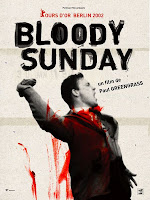
Writer/Director: Paul Greengrass
Year: 2002
Cinematographer: Ivan Strasburg
Rarely does cinema have a tangible impact on real life, making our world a little better. One's mind springs directly to a film like Errol Morris' "The Thin Blue Line" which saved an innocent man from prison.
But here is another example, a film that sets an example for filmmakers who want to make a difference in the world, but who would rather make a scripted, acted, kind of cinema rather than documentary cinema.
Here, a team of British and Irish filmmakers got together to make a documentary-style recounting of the Bloody Sunday massacre in Derry, Ireland in January of 1972, an event forever etched into the memory of the Irish, while the British (including the queen) have tried to forget the event for almost 40 years. Both sides have refused to take responsibility for the tragedy, and so the filmmakers stepped up to make a film that gives a reasonable, realistic retelling, painting the complexity of the conflict and the chaos of that day. It does not paint black and white guilt and innocence, it does not over-exaggerate the mal-intent of the British military, yet it does not act so naive as to show all as innocents.
It presents a version of the story that is more believable than the official reports made by the British military leadership, with the aim of bringing the topic up for renewed conversation, offering understanding, and asking very reasonably for an apology for an event that spurred 3 more decades of violence which ripped Ireland apart.
And the film seems to have succeeded, after raising social awareness to the event by bringing it back to the British conscience, a new report was made which more or less agreed with the film's interpretation of events, and was later followed by the first official apology by Britain's Prime Minister on behalf of the nation.
Does a great job of putting you in the moment, of explaining complexity and chaos without holding the audience's hand. Does what a great event documentary does, but without any distracting interviews, rather it keeps you in and among the series of significant moments and decisions that make the event what it was.

















